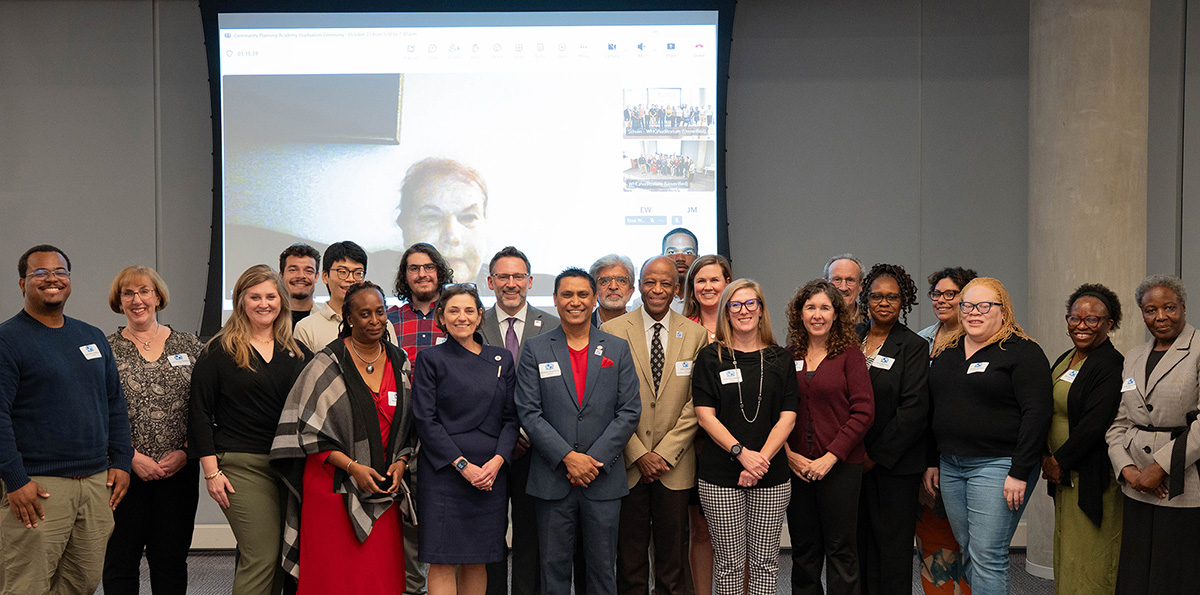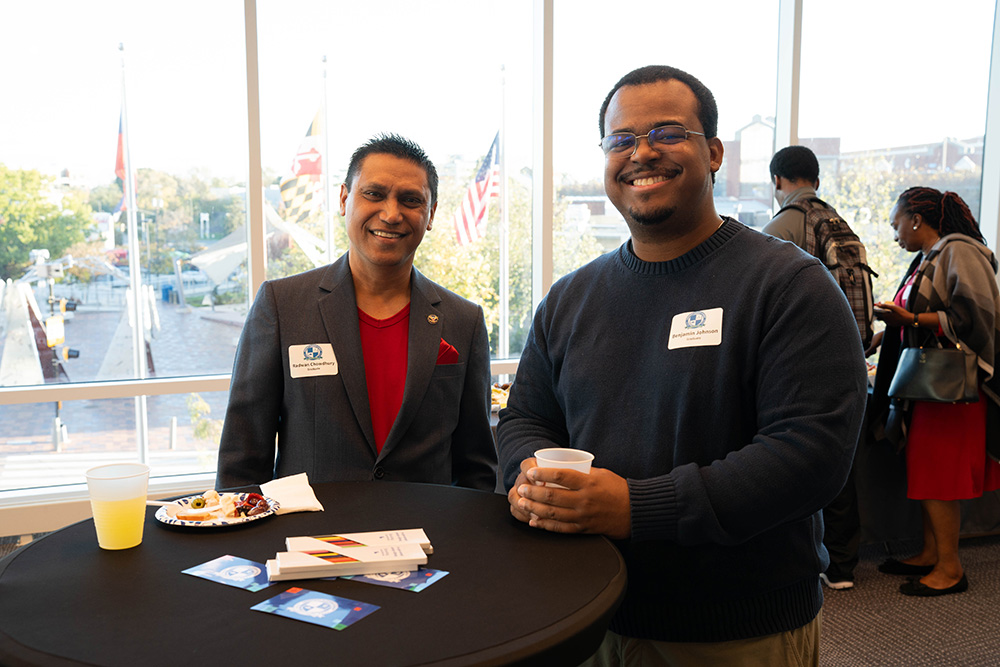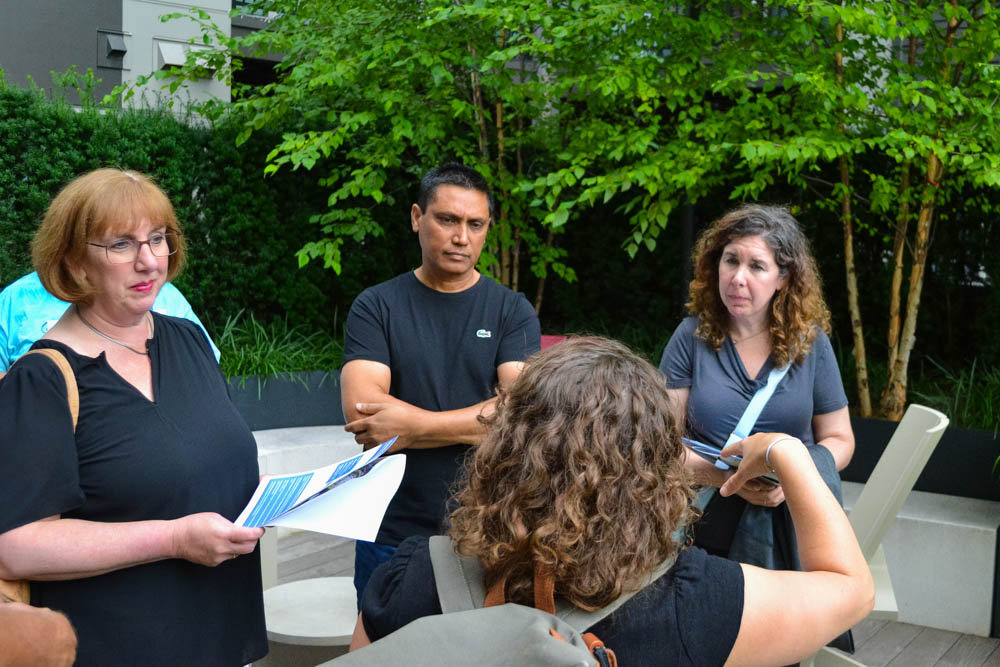University of Maryland student Ricardo Hernandez wonders how he’ll afford to continue living in Montgomery County when he moves out of his parents’ home. Community organizer Sergine Yango is concerned about clean air. Restaurant owner Radwan Chowdhury has wondered how local governments decide to issue new construction permits.

Ricardo Hernandez, member of the Summer 2025 Class, asks a question during the June 2025 kickoff meeting.
They and 45 other Montgomery residents were among the first graduates of our new Community Planning Academy, a free online course that explains the ins and outs of the planning process. The 10 interactive and self-paced lessons, each 30 to 45 minutes long, cover everything from zoning basics to the development review process to how to weigh in on your community’s Master Plan.
Starting December 1, the virtual academy will open to everyone 18 and older.
Our goal: To make the planning process more accessible, inclusive, and transparent, especially for people we don’t traditionally hear from. We believe helping residents better understand how planning decisions shape their communities empowers them to make their voices heard.
As Montgomery Planning Director Jason Sartori told the academy’s first cohort during their October 23 graduation, “You’ve built a foundation of knowledge that will ripple outward into your communities, your town halls, and your everyday conversations.”

Class photo of the Community Planning Academy Summer 2025 Class at M-NCPPC Wheaton Headquarters. The event included remarks from Delegate Lesley Lopez (D-39), County Council President Kate Stewart and Planning Board Chair Artie Harris.
Chowdhury, 49, who lives in Burtonsville, said he was surprised to learn all that goes into the county’s consideration of building permit applications, including input from utilities, such as WSSC Water.
“Behind the scenes, there’s this huge chain of interconnected departments involved in [considering] your permit,” he said. “That was very eye opening to me.”

Ruwan Chowdhury (left) and Benjamin Johnson at the Community Planning Academy Summer 2025 Class graduation ceremony at the M-NCPPC Wheaton Headquarters.
While some other D.C.-area planning agencies have similar educational programs, ours is the first in the region offered entirely online. That gives participants more flexibility to learn when and where it’s most convenient and greatly expands the number we can serve.
Yango, 54, who lives in White Oak, said she squeezed in sessions between her community organizing work, raising three teenagers, and traveling to visit her mother. She said she plans to share what she learned with her neighbors and fellow church members, including how to get involved when their community’s Master Plan is drafted.
“The most interesting thing I learned is how communities can do research to make sure they’re building things in the right place,” she said.
Hernandez, 21, a University of Maryland junior who also lives in White Oak, said he logged into the academy’s videos between college lectures and his part-time job as a pharmacy technician. As White Oak attracts new development, he said, he wants to help make sure it and other parts of Montgomery remain affordable.
“I figured if I had a base of knowledge,” he said, “I’d know what I was talking about when I got involved.”
Hernandez, who also plans to pursue a career in urban planning, said he was particularly interested to learn how Montgomery planners take air quality into account.
“I feel like you don’t hear about climate change much in urban planning,” Hernandez said. “It’s all about walkability, but that doesn’t really matter if it’s super unpleasant to go outside.”

Participants of the Summer 2025 Class took a tour of the Atwell on Spring multi-use development in downtown Silver Spring to learn about approved projects and the planning process.
Participants in the academy’s trial run in summer 2025 were selected to have little, if any, previous experience with the planning process. They also represented Montgomery’s rich cultural and economic diversity. The academy is available in English, Spanish, and Mandarin.
We’ve used their feedback to make the course more user-friendly and were excited to hear so many found the lessons helpful. Nine in 10 said they were very satisfied (66%) or satisfied (25%) and would recommend it to others. Almost all—98%—said after they had finished the course they were very likely or likely to participate in planning-related activities.
The academy will remain free, and no application is required going forward. The “textbook” is available to anyone, regardless of whether they take the course.
We will look for the academy’s true impact in larger crowds at public hearings, more public comments on development proposals, and more residents from diverse communities joining in the planning process.
We hope they will include Hernandez, as well as the friends and family members he told us he plans to encourage to attend meetings where planning decisions are made.
“Now that I have a little understanding of the process,” he told us, “I can emphasize the importance of showing up physically and being there—to let your thoughts be heard.”
It’s exactly what we wanted to hear. As Montgomery Planning Board Chair Artie Harris told Hernandez and his fellow Community Planning Academy graduates, “Planning works best when we have strong engagement from our residents—I hope this is just the start of your journey with us.”


Leave a Reply